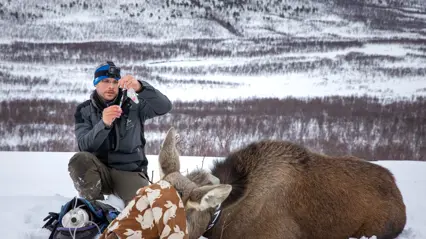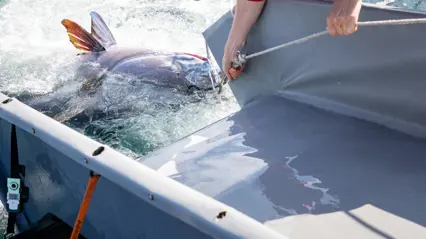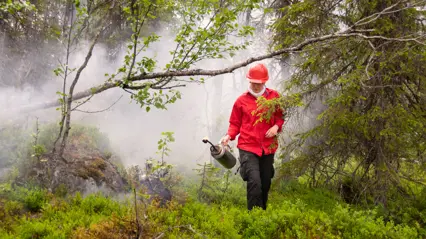
Our research
Our research ranges from basic biological questions to applied studies linked to forestry, fishing and hunting. Key themes in our research include biodiversity and the sustainable use of natural resources.

Our courses and programmes
We offer a unique Master's programme in conservation and management of fish and wildlife. You can also take freestanding courses or do your Master's thesis with us.

Contact us
Do you have questions about our programmes and courses or our research? Here, you will find contact details for the people who have the answers.
Wireless Remote Animal Monitoring
SLU WRAM is a national knowledge centre and platform for animal data.
Contribute to a sustainable future for fish and wildlife
Our international Master's programme is unique, and lectures are given by world-leading researchers.
News & Events
News
-
SLU launches large-scale fish tracking – aiming to provide new insights about fish in the Baltic Sea
SLU has deployed 80 acoustic receivers along two lines in the Baltic Sea. By listening for signals from tagged fish, the receivers will reveal migration routes and uncover new insights on life beneath the waves. This is important for both research and management of fish in the Baltic Sea. -
Moose in Decline in Europe Despite Iconic Status
The iconic status of the moose offers no guarantee or prosperity. While the population of greatest ungulate around the globe is stable in North America the moose population is decreasing in Europe. -
She maps the movement of moose in the managed forest landscape
How are moose movement patterns affected by our managed forests? This is what PhD student Desirée Guidobaldi Stenbacka is trying to find out and hopes that this understanding can support a more sustainable coexistence between moose and forestry. -
Moose footage reveals: Make conscious food choices for the right nutritional balance
Using camera collars and the moose's own films, researchers have investigated why moose eat the way they do. The study, conducted on moose in Norway during the summer, shows that moose consciously choose to eat different types of plants to get the overall nutrition they need. -
Pharmaceutical pollution affects migration in Atlantic salmon
Young salmon exposed to pharmaceutical pollution change their behaviour. They prefer to swim alone rather than in shoals and take greater risks during the vital migration from river to sea. This is the result of a unique new study conducted at the Swedish University of Agricultural Sciences, SLU.
Calendar
Research projects
-
Identifying and quantifying chemical threats to the species of “Darwin’s Dreamponds”
Lake Tanganyika is one of the world's most important freshwater sources, but it is seriously threatened by anthropogenic stress factors such as pollution. The project aims to provide some of the first information on organic chemical pollution in the southern part of the lake. -
Effects of ecological niche construction on life history and mating patterns
The idea that animals influence their environment in ways that can affect themselves and even influence their evolutionary selection pressure is summarised in the concept of ‘ecological niche construction’. The project utilises a unique natural experiment to measure the consequences of this. -
The structure of complex animal societies
Animals display a wide range of social phenotypes. Some animals are highly social and enjoy the company of others, while other animals prefer to remain solitary. Why is this? -
Threats to Arctic charr - species interactions and climate change
In this project, we investigate the critical factors that affect Arctic charr, using field sampling, historical data and population models. -
Lake food web responses to variation in land use practices across environmental gradients
This project will address how land-use change and forestry practises have altered, and may come to further alter, lake ecosystem diversity and function through inputs of dissolved organic matter (DOM) and nutrients along natural gradients in lake-biogeochemistry and catchment vegetation.